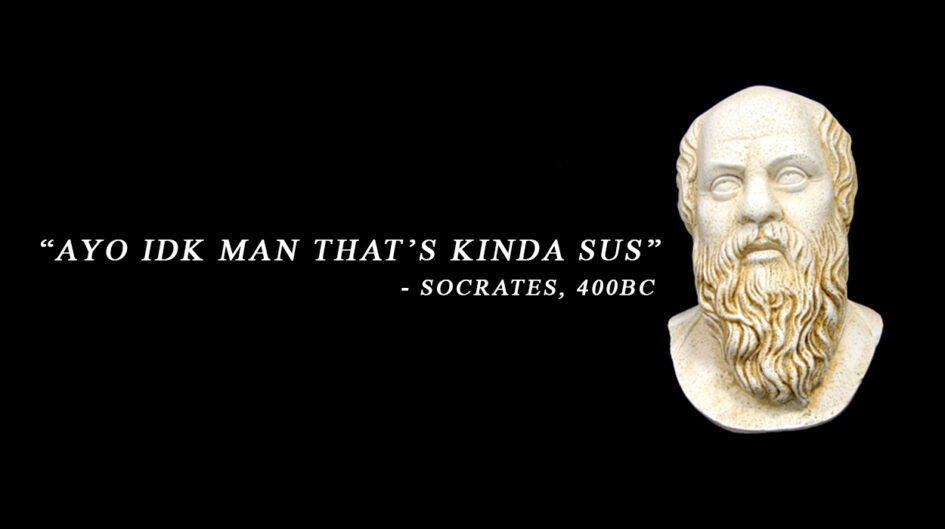“I slayed my tests, no cap. A huge W for me!” Imagine a linguistics scholar a few hundred years from now trying to figure out how a cap correlates to vanquishing a test and exactly what this w is. Or consider explaining, “O, you eternal varmint of a bat—I’ll show you how to flumadiddle around me!” to someone now. The tone might convey a general sense of the sentence, but the exact meaning and effect are lost. So, how exactly do we come to associate meanings with certain words? And how likely are they to stay relevant throughout time?
Like the evolution of different languages, differences within a dominant culture determine words, lingo, and overall slang. Slang words have historically been adopted and developed by subcultures within societies. Criminal groups, Pirates and Deviants, have established specialized lingos for purposes as varied as secret communication, signaling, and opposition to taboos.
Gen-Z has a common platform and is a generation of digital natives. What results is a space for huge-scale discussions and exchanges. While not everyone on the internet is divided into “yeet truthers” and grammar snobs, it is undeniable how widespread gen-z lingo is, making its way into almost every internet interaction through words like lol and omg.
What separates Gen-Z lingo is the particular brand of humor from which it originates. It has layers of irony, nihilism, and absurdism. The result is a varied and unique vocabulary that requires a certain level of shared comprehension.
Popular culture influences almost every aspect of Gen-Z, and language is no exception. Specific phrases, memes, and insider jokes are popularized and widely circulated throughout cyberspace and seep into everyday use. They reflect different attitudes and are most effective as sophisticated expressions. It has led to lingo guides on the internet explaining the meaning of terms like “wig snatched.”

Like most words, different lingos emerge, adapt newer meanings, and fizzle out. Some survive the wear of time as most Shakespearian terms have, ranging from the trendy Swagger to the classic Cold-blooded.
While most English slang derives from AAVE( African-American Vernacular English), there is a rise in informal lingo across all languages. Most lingo gets popularized through movies and changes along with the trends.
Although some slangs develop as part of the widely spoken word, historically, the circulation of lingo in the dominant culture has been by word of mouth. It explains why lingo is traditionally viewed as derogatory, as most lingo originates from lower-class groups. With the advent of the internet, trends have changed. There is a rise in the popularity of different lingos. Most internet slang derives from pre-existing lingos depending on the language.
The current generation is more inclined to visual comprehension, which leads to shortened written words. With limited attention spans and various marketing gigs, shorter forms of writing are taking over the trends. Social media sites provide platforms with word limits and saturated visual media. Short-hand forms of words have emerged as popular lingos.
Most of Gen-Z lingo is reminiscent of newspeak from George Orwell’s 1984–he envisioned a dystopia in which limited vocabulary was a means of limiting free thought and, ultimately, any rebellion. Most terms in the modern lingo make little to no sense by themself but are more digestible and trendy than the conventional words and meanings.
Doublethink is another way of speaking in contradictions, and meta irony in gen-z humor is a perfect example. Most Gen-Z jokes don’t have a single punchline, instead relying on layers of irony and sarcasm to convey a point that may or may not be the actual intention. Lingo carries a shock value and expresses concepts through exaggeration and euphemism in a way that common words usually can’t.
So, are we in an Orwellian dystopia? Our lingo uncannily resembles the language used to subdue the masses in his novels. But unlike in them, it is used to portray dissent. Gen-Z uses doublethink and newspeak to express existential dread. Lingo develops as a criticism of societal norms and taboos– it tends to be dark and extreme.
On the other hand, many argue that the new trends in lingo and humor move toward consumerism. The gratification and constant access to the matrix through trendy lingo only encourage conformity and similar thought. Linguists worry that excessive use of lingo online only leads to superficial communication.
While some might consider Gen-Z lingo in a negative light, to others, it’s a form of self-expression. Redefining, sharing, and using Gen-Z lingo is a constant process that happens on a large scale. It presents a unique setting where various outcomes are possible. While certain usage of lingo is used in framing media in a way that is more acceptable or considered woke, lingo is just one part of the language. So, while we can’t be sure how long people are going to ‘vibe’ with the ‘tea’, words will always define an era–ours just happens to be very ‘extra’.
PS: No urban dictionary or slang guides were harmed in the making of this article.



Leave a Reply